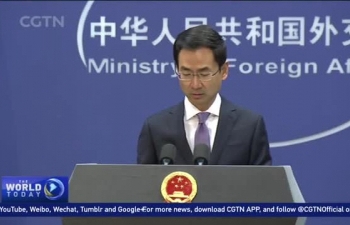WASHINGTON, May 16 (Xinhua) -- A peer-reviewed article published on Wednesday in the journal Joule estimated that the bitcoin network could be using half of one percent of the world's total electric consumption.
Financial economist and blockchain specialist Alex de Vries used a new method to pinpoint where Bitcoin's electric energy consumption is headed and how soon it might get there.
His estimates, based in economics, put the minimum current usage of the Bitcoin network at 2.55 gigawatts, which means it uses almost as much electricity as Ireland does.
A single transaction uses as much electricity as an average household in the Netherlands uses in a month, according to the study.
By the end of this year, he predicts the network could be using as much as 7.7 gigawatts, as much as Austria and half of a percent of the world's total consumption.
"To me, half a percent is already quite shocking. It's an extreme difference compared to the regular financial system, and this increasing electricity demand is definitely not going to help us reach our climate goals," said de Vries, who works at the Experience Center of PwC in the Netherlands and is the founder of Digiconomist, a blog that aims to better inform cryptocurrency users.
If the price of Bitcoin continues to increase the way some experts have predicted, de Vries believes the network could someday consume 5 percent of the world's electricity. "That would be quite bad."
Bitcoin is dependent on computers that time-stamp transactions into an ongoing chain to prevent duplicate spending of coins. Computers in the network perform calculations continuously, competing for the chance, once every ten minutes, to be appointed to create the next block of transactions in the chain.
The user of the computer that wins is awarded 12.5 new coins, a process known as "mining" Bitcoin. But all the time, even the users that don't win are expending computing power.
"You are generating numbers the whole time and the machines you're using for that use electricity. But if you want to get a bigger slice of the pie, you need to increase your computing power. So there's a big incentive for people to increase how much they're spending on electricity and on machines," said de Vries.













